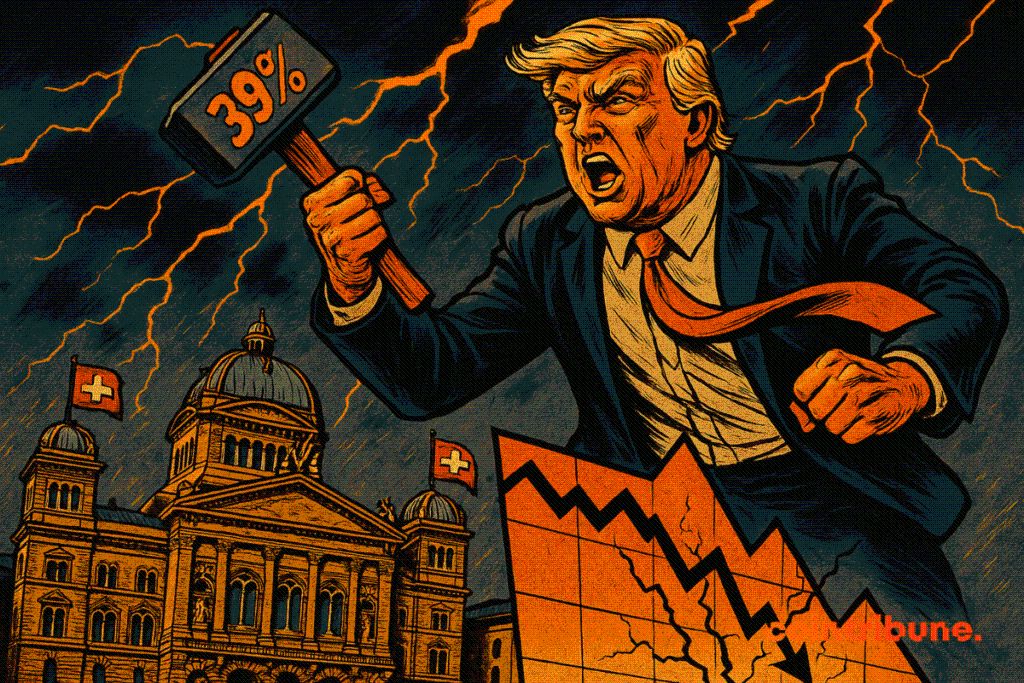Donald Trump Unleashes Economic Shockwave on Switzerland with New Tariffs
In Bern, the announcement had the effect of a shock: Donald Trump hits hard by imposing 39% customs duties on Swiss products, relegating the Confederation to the status of an economic target. Citing an “intolerable” trade deficit, he accuses Switzerland of “stealing” from the United States. A frontal attack that shakes Swiss neutrality and plunges the government as well as the markets into uncertainty. But behind this brutal offensive, a question arises: how far will the economic war led by Trump go?

In Brief
- Trump imposes 39% taxes on Switzerland: a trade war shaking Europe.
- Neutrality trampled, markets shaken: Switzerland takes the Trump shock.
- This economic power play marks a harsh turning point in transatlantic relations.
Trump renews the trade war and Switzerland suffers
While his administration has just published a strategic report on crypto affirming its openness to innovation, Trump hits Switzerland with a customs attack, citing a trade imbalance of 40 billion francs. A decision that fits less into an economic logic than a protectionist retreat consistent with his nationalist rhetoric: no one is safe.
The Swiss reaction was quick. The Federal Council expresses its “deep regret” and tries to obtain a reprieve before the sanctions take effect, scheduled for August 7.
Meanwhile, Swiss companies are wondering: how to absorb a surcharge of such magnitude without losing their footing in the American market? This unilateral decision marks a new escalation in the trade crisis between Trump and Switzerland, whose stakes go far beyond the simple tariff dispute.
The first victims of the trade offensive launched by Trump are already appearing. In the front line, the watch industry, a national jewel, is preparing for a dark year. The 39% tax imposed by Trump on exports to the United States could wipe away months of post-Covid recovery.
Machine tool manufacturers are also sounding the alarm. Their margins, already fragile, risk collapsing under the pressure of Trump’s economic decisions. Finally, on the stock exchange, the reaction was immediate. From the opening, indices plunged 2%, a clear sign of market nervousness.
The economy under tension: the domino effect to expect
Behind this harsh measure lies a much larger risk. Switzerland, long supported by steady growth and strong exports, sees its economic model wobble.
Several economists are already sounding the alarm. Annual growth could drop from 0.3% to 0.6%. A hard blow for a country so dependent on the international scene. And if the pharmaceutical industry, still spared, were also to be affected, the contraction could rise to 0.7%, or even beyond.
What worries the most is the uncertainty. With Donald Trump, nothing is ever certain. A decision may fall on a simple whim, a statement enough to shake the markets. In this climate of permanent unpredictability, Swiss companies struggle to anticipate, to organize, and above all to protect their future.
Europe, although it threatens Washington with an unprecedented economic war , remains surprisingly silent. Yet the issue goes far beyond the bilateral framework. It raises an essential question: if Switzerland, neutral and conciliatory, can be treated this way, who will be next? The domino effect could well redraw the rules of international trade in the Trump style.
Disclaimer: The content of this article solely reflects the author's opinion and does not represent the platform in any capacity. This article is not intended to serve as a reference for making investment decisions.
You may also like
2025 TGE Survival Ranking: Who Will Rise to the Top and Who Will Fall? Complete Grading of 30+ New Tokens, AVICI Dominates S+
The article analyzes the TGE performance of multiple blockchain projects, evaluating project performance using three dimensions: current price versus all-time high, time span, and liquidity-to-market cap ratio. Projects are then categorized into five grades: S, A, B, C, and D. Summary generated by Mars AI This summary was generated by the Mars AI model, and the accuracy and completeness of its content are still being iteratively updated.

Mars Finance | "Machi" increases long positions, profits exceed 10 million dollars, whale shorts 1,000 BTC
Russian households have invested 3.7 billion rubles in cryptocurrency derivatives, mainly dominated by a few large players. INTERPOL has listed cryptocurrency fraud as a global threat. Malicious Chrome extensions are stealing Solana funds. The UK has proposed new tax regulations for DeFi. Bitcoin surpasses $91,000. Summary generated by Mars AI. The accuracy and completeness of this summary are still being iteratively updated by the Mars AI model.

How much is ETH really worth? Hashed provides 10 different valuation methods in one go
After taking a weighted average, the fair price of ETH exceeds $4,700.

Dragonfly partner: Crypto has fallen into financial cynicism, and those valuing public blockchains with PE ratios have already lost
People tend to overestimate what can happen in two years, but underestimate what can happen in ten years.

